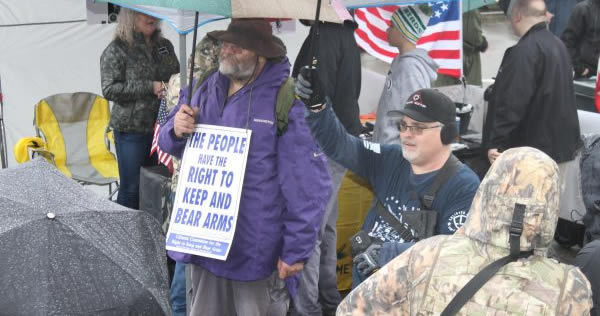
A new Washington Post-ABC News poll released Wednesday reveals fewer Americans consider gun control a priority than they did in 2018, while there is a marked uptick in the number of people who feel protecting Second Amendment rights is a greater priority.
The survey was released just hours ahead of President Joe Biden’s much-ballyhooed address to Congress during which, according to USA Today, he is planning to “pressure lawmakers to confront gun violence.” The newspaper also reported Biden “will repeat calls for Congress to pass two House bills to strengthen background checks for gun buyers and close the so-called Charleston loophole, which allows gun sales to proceed without a completed background check if three business days have lapsed, according to the official, who spoke on the condition of anonymity to discuss the president’s remarks. The bills, which have broad public support, have languished in an evenly divided Senate where Democrats would need to maintain their razor-thin majority while also finding 10 Republican votes.”
The Washington Post-ABC News poll was conducted by telephone April 18-21 among a random national sample of 1,007 adults, with 75 percent reached on cell phones and 25 percent on landlines. Sampling, field work and data processing by Abt Associates of Rockville, MD. Results have a margin of error of plus or minus 3.5 percentage points for the full sample, including design effects due to weighting, the survey noted.
The WaPo-ABC poll follows on the heels of a Rasmussen survey showing more American voters favor enforcing existing gun laws over passing new ones. The WaPo-ABC poll is the third straight survey that suggests gun rights is an increasingly important issue among Americans, with the first survey released two weeks ago from McLaughlin & Associates.
According to The Hill, 50 percent of survey respondents “say passing new gun control legislation should be a priority, a drop from 57 percent in 2018, which represented a high-water mark for the issue after the fatal shooting at Marjory Stoneman Douglas High School.
“Meanwhile,” The Hill noted, “43 percent of Americans said protecting the right to own guns should be a bigger priority, a jump from 34 percent three years ago.”
There is no indication whether the surge in new gun ownership over the past 12 months—spurred possibly by the COVID-19 pandemic panic and then a summer of urban protests and rioting accompanied by shrinking police forces—is a factor in the rise of Second Amendment support. There have been estimates that as many as 8 million Americans purchased guns for the first time during the past year, learning in the process that buying guns legally is not as easy as they had been led to believe.
However, Alan Gottlieb, chairman of the Citizens Committee for the Right to Keep and Bear Arms, credits energetic TV, radio and digital advertising campaigns conducted over the past two months by CCRKBA and its sister organization, the Second Amendment Foundation, for helping to educate the public about gun rights and the threat gun owners face from new gun control legislation.
Another telling result of the WaPo-ABC survey is that 32 percent of respondents think there has been too much emphasis on passing new gun laws while 32 percent say there is too little emphasis. Another 28 percent believe there has been the right amount of emphasis.
Earlier polls by Rasmussen and McLaughlin show a majority prefer existing laws to be enforced over passing new gun restrictions.
Like so many other news agencies, USA Today persists in using terms created by the gun control/prohibition lobby: “gun violence” and “gun safety.”
However, the newspaper did report Biden does have an “ambitious gun control agenda.” Just how successful he will be in moving that agenda forward remains speculative at best. With the Senate evenly divided and House Democrats operating on a thin majority.
USA Today’s report also noted, “In 1993, Biden helped shepherd through Congress the Brady Handgun Violence Prevention Act. A year later he helped implement a 10-year ban on assault weapons.”
Not mentioned is the fact that pushing through these two measures during the Bill Clinton administration cost Democrats control of Congress in November 1994, which they held for more than a decade.